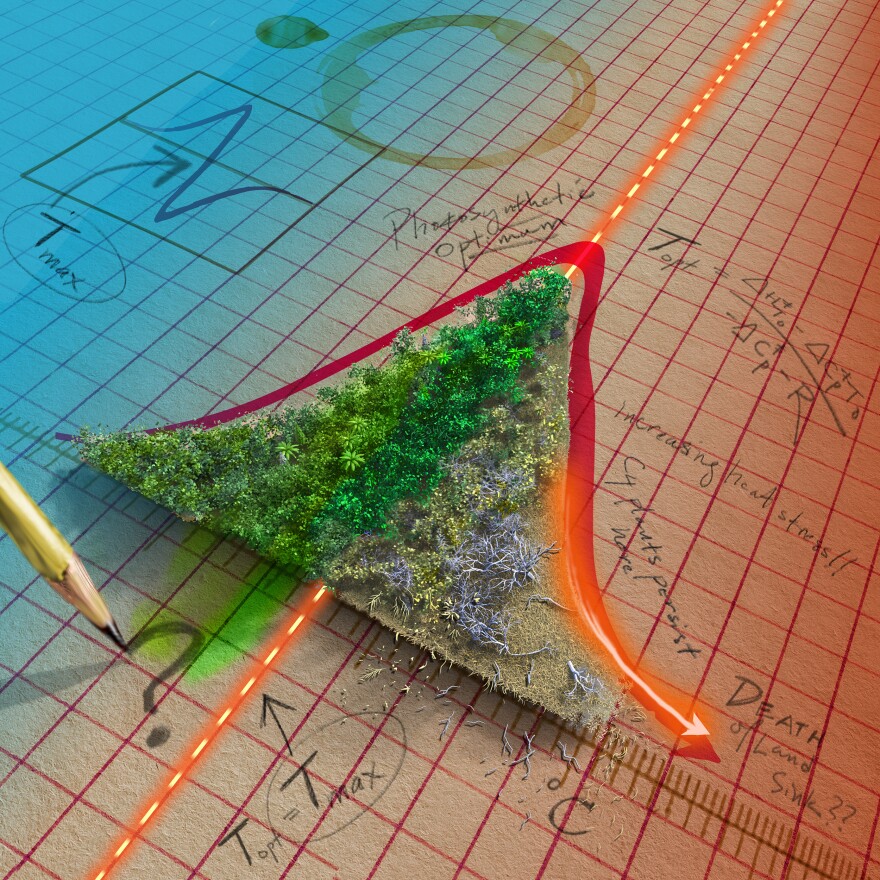A new study published last week shows Earth’s ecosystems are fast losing their ability to soak up extra carbon from the atmosphere. Scientists collected data about how plants take up carbon all over the globe and found the warming planet could reach a critical tipping point in the next two or three decades, when many ecosystems no longer act as “sinks” for carbon and become sources instead. KNAU’s Melissa Sevigny spoke with lead author Katharyn Duffy of Northern Arizona University about her findings.
Tell me what is the question you wanted to answer when you started this research.
The metaphor I like to use is the human body. We know that—if we’re going to use U.S terms—the human body operates around 97 degrees, and that’s our sweet spot for when our metabolism and our body works well. But when we get to a certain temperature, say 106 degrees, our body starts to break down… So the question we set out to answer was that: as a scientific community we didn’t know what those temperatures were for all the plants on the Earth, for the terrestrial biosphere essentially. And so what we’ve gone about doing, is defining for the first time a global temperature dependence curve for photosynthesis.
So as the planet’s warming, there’s a point where it hits a temperature where these processes like photosynthesis start to break down?
Exactly. It doesn’t mean it stops, it means it slows. We care about it slowing because we want it to pick up as much of the carbon as it can from the atmosphere… simply because that’s carbon that’s stored in trees and things like that… and so it’s mitigating climate change.
Talk to me about what you found out. As the global temperature rises, at what point do you starting seeing that photosynthesis slow down?
The temperature maximum for photosynthesis is much lower than that of respiration… (And by respiration I mean the breakdown of that carbon by soil microbes, etc, or plants themselves) …. The temperature maximum for photosynthesis is somewhere between 18 and 28 degrees Celsius. For respiration it’s all the way out at 50 or 70 degrees Celsius. So as photosynthesis is declining, respiration is exponentially increasing. It means that instead of the terrestrial biosphere picking up carbon every year, it is now actually a source of carbon to the atmosphere… And that is a powerful tipping point for the Earth system, in that it’s a reversal of what we’ve seen over the last couple of decades, where the terrestrial biosphere has been taking up carbon, it’s been picking up part of our tab for our emissions. That could reverse if we don’t mitigate warming.
How quickly can that happen? If we say on the current course with climate change, when will Earth’s ecosystem switch from taking up carbon to releasing it?
What we found in our study is that—because we were able to calculate this on a pixel by pixel basis—by as early as midcentury the biosphere could be picking up half of the carbon that it’s doing today.
It’ll cut in half?
Exactly. Which is a big shift when you’re thinking about petagrams of carbon.
So soon. Like the next couple of decades.
In the next couple of decades. That was one of the most surprising things we found. We kept on checking on the data. Like, surely we’re wrong. We can’t be this close. … And I think about the biosphere struggling midcentury, and how that is also a time when we expect to be feeding about nine billion people. And nine billion people we’re not just feeding, but we’re relying on timber, we’re relying on a lot of the ecosystem services, and I see it as a very scary interaction to be honest…. We don’t have to go down this path. If we can proactively mitigate warming, if we can take action today, we can mitigate this loss. We can continue to rely on the biosphere for all the services that it provides.
Katharyn Duffy, thank you so much for speaking with me.
I really appreciate it.
Correction: An earlier version of this story misstated 'petagrams' as 'petabytes'.








